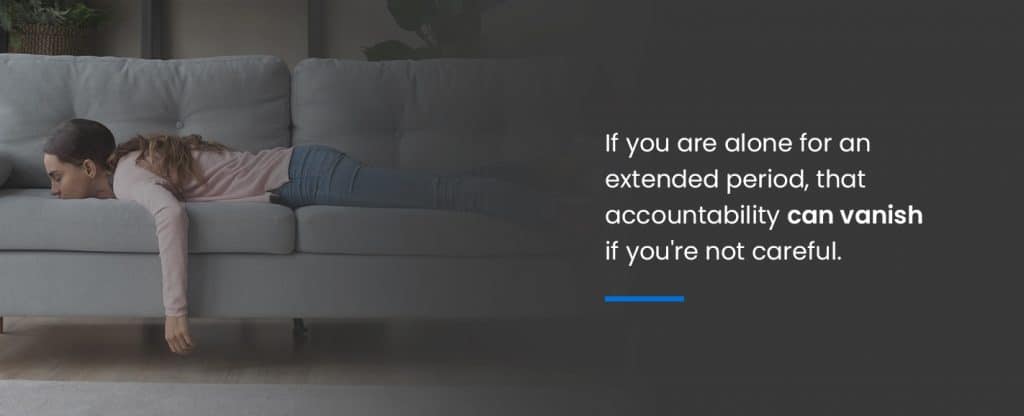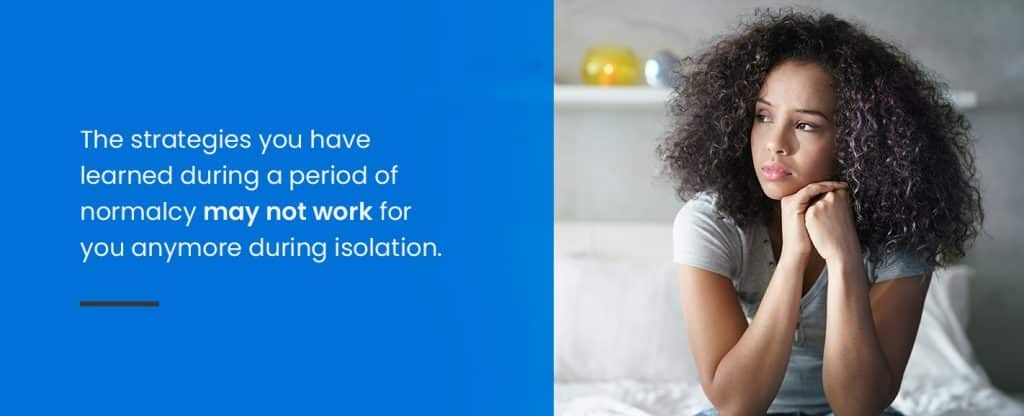Identifying factors that contribute to the opioid addiction crisis is one of the most important steps we can take to improve the chances of success for those in recovery. One factor that many overlook or underestimate is the role of isolation in the development and advancement of opioid addiction. How does spending too much time alone affect mental health and worsen a person’s substance abuse? In this guide, we’ll break down how being cut off from socialization changes how we must approach addiction and recovery.
How Does Isolation Fuel Opioid Addiction?
Social support is closely tied to better treatment adherence and recovery outcomes. Similarly, being socially isolated while struggling with addiction makes the condition worse in a number of ways. Here are three of the main issues that contribute to escalating opioid abuse during a period of isolation:
1. Excess Idle Time
Many people begin abusing drugs like opioids as a result of being bored and having too much time on their hands. As drug abuse progresses into addiction, boredom becomes even more of a factor because the substance is re-wiring the brain to receive more gratification from opioids than from normal activities. The person using opioids becomes more and more likely to do drugs as the first defense against boredom.
Normally, there is some routine in place that keeps people from abusing drugs at all hours of the day. However, when work, school and social activity are halted, people struggling with addiction have to face more cravings while also having fewer options for combating them.
2. Depression and Anxiety
Depression and anxiety have a cyclical relationship with isolation. Being isolated increases the symptoms of both conditions — and both conditions make it more likely for a person to estrange themselves from friends and family.
These mental health conditions are often foundational to the development of addiction, as people try to avoid the negative symptoms by numbing them with opioids. When someone is isolated from others, they may start to feel like continuously self-medicating is the only way to stop depression and anxiety symptoms from overwhelming them. However, doing so only makes the symptoms worse.
3. Lack of Accountability
Social support is a crucial element of a successful recovery because it provides some external accountability. When you are going to visit your parents or have a support group meeting later in the week, you can use the promise of those interactions to talk yourself out of relapsing. If you are alone for an extended period, that accountability can vanish if you’re not careful. It often feels like if no one is around to see or notice that you’ve relapsed, you can get away with it.

Getting Help for Opioid Addiction When You’re Alone
Being isolated from others makes it harder to seek treatment in a few different ways. Making the decision to enter an opioid addiction treatment program often involves having hard face-to-face conversations that make you realize you need help. If you aren’t getting that kind of support, you will need to think outside the box to find your motivation.
Telehealth or telecounseling is one good option gaining traction among providers and clients alike. For some people, it may even make the process of getting help easier. Talking to a mental health professional over the phone or through videoconferencing may be less stressful than the traditional means of walking into a clinic, and there are fewer options to back out along the way. Telehealth can help provide some of the support you need to maintain your recovery while also making advancements in coping skills while you are alone.
Maintaining Recovery From Opioids During a Time of Social Isolation
If you have already begun your recovery, you have to be careful not to lose your hard-earned progress in a period of isolation. There are many tactics you can choose from to ensure you’re taking adequate care of your mental health and feeling as stable as possible — for example:
1. Talk to Others
The best way to combat isolation is to be extra intentional about maintaining relationships. Setting up even one weekly call with a friend, family member or sponsor is a good way to maintain a routine and keep some accountability in your life. You don’t need to have a long heart-to-heart every time you talk to someone, either. A quick but regular check-in can provide similar benefits.
2. Don’t Feel Guilty Asking for Help
The idea of asking for support or help can be daunting at any time, and it may become even more of a challenge when you won’t have physical cues that help you interpret someone’s response. As a result, you may feel guilty when you need to talk to someone. Unfortunately, guilt has a tendency to make cravings worse.
You should also forgive yourself for the cravings you have. It’s natural to experience a heightened desire for opioids during a period of stress and isolation — just be sure to use your suite of coping skills to handle them in a healthy manner.
3. Learn New Strategies

The strategies you have learned during a period of normalcy may not work for you anymore during isolation. For example, if you are unable to grab a coffee with your sponsor at your normal time of the week, you will need to find another healthy outlet to replace that activity. It may feel uncomfortable to try and apply new strategies while you’re feeling at risk of relapse, but staying flexible and adapting to your current circumstances is a critical part of maintaining your recovery.
How the Coronavirus Pandemic Puts Recovery at Risk
The novel coronavirus and the social distancing measures it has triggered have upended the lives of many people struggling with addiction and living in recovery. While self-imposed isolation has negative mental health effects, living under the uncertainty of lockdown is even worse, making it all the more important for people to seek addiction treatment services. However, many facilities are closing or failing to adapt to new circumstances through the use of tools like telehealth.
Luckily, there is some good news for those seeking to start or maintain recovery from opioid addiction during this pandemic. The President of the American Association for the Treatment of Opioid Dependence, Mark Parrino, issued guidelines on how treatment centers can continue to serve clients. His recommendation involves clinics offering a methadone or buprenorphine supply for 14 to 28 days to reduce the number of trips necessary. For those dedicated to their recovery, this is good news.
How AppleGate Recovery Can Help
AppleGate Recovery is still here for you. We are still serving clients under guidelines issued by the state, and recommendations from the CDC. Your health and safety are paramount to us, and we are ready to support your recovery in a safe manner. Call AppleGate Recovery at 888-488-5337 to learn more, or send a message to the nearest program.

Contact AppleGate Recovery Today
If opioid addiction is impacting your life or the life of someone you care about, reach out to our treatment center. We are here to provide the support and care you need to take the first step toward recovery.
Call 888.488.5337